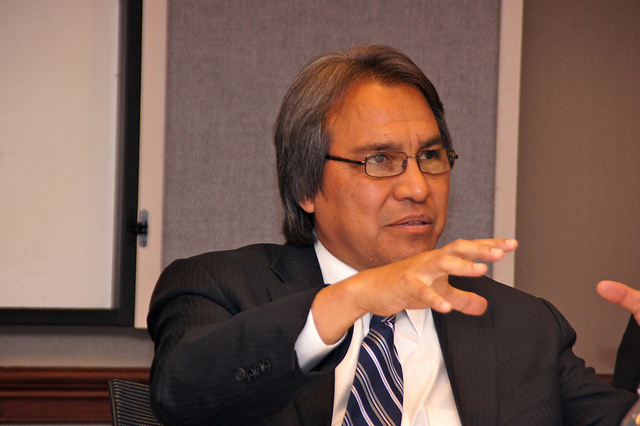The United Nations Rapporteur on the rights of Indigenous Peoples James Anaya released his advanced, unedited report on “The Situation of Indigenous Peoples in Canada.” The Rapporteur based his report on research, various sources, a visit to Canada in October 7-15, 2013, meetings with federal and provincial government officials, and meetings, visits with and submissions from Indigenous peoples.
There is a disturbing underlying theme in the report — one that speaks of “dramatic contradictions”:
- The continued “abysmal” social conditions in First Nations in the context of increasing wealth and prosperity in Canada; and
- The numerous laws and protections for First Nation rights versus the many human rights violations committed against First Nations.
Anaya noted that while some First Nations have risen up against these injustices with the Idle No More movement, others are starting to give up attempts to resolve their claims. Anaya concluded that the relationship between Canada and First Nations has become much worse since the last visit to Canada in 2003. It doesn’t take a rocket scientist to figure out that this is during Prime Minister Harper’s term.
Abysmal Social Conditions in First Nations
Anaya’s most serious concerns relate to the “striking” statistics related to the poverty in many First Nations. Of the bottom 100 communities in Canada, 96 are First Nations. “The most jarring manifestation of these human rights problems in the distressing socio-economic conditions of indigenous peoples in a highly developed country.”
He found that there has been no improvement in the gap between First Nations and Canadians in terms of housing, health care, education, welfare and social services. Given the significant needs of First Nations, Anaya had expected that the cost of social services would have been higher and was shocked to find that it was lower. He cited Canada’s own Auditor General who pointed out that the failure to address poverty on reserve is due to the lack of appropriate funding from the federal government.
This led Anaya to conclude: “One of the most dramatic contradictions indigenous peoples in Canada face is that so many live in abysmal conditions on traditional territories that are full of valuable and plentiful natural resources.”
Canada’s Immense Wealth and Prosperity
It’s not like there isn’t enough money to go around. Canada is one of the wealthiest countries in the world because of the lands and resources that belong to Indigenous peoples. The mining industry alone brought in $44 billion in 2013.
That figure doesn’t include the hundreds of billions in other natural resources that come straight from Indigenous lands. Anaya noted that while governments and private interests are the ones that profit from resources on Indigenous lands, it’s the Indigenous peoples who suffer all the negative consequences in health, economy and culture that comes with the resulting environmental degradation.
This situation is not just unfortunate, but an inevitable consequence of western “progress” — it’s a calculated policy choice to impoverish First Nations for the benefit of others. Anaya notes that Canada’s consistent failure to consult with First Nations, take unilateral actions against their rights and portray them in negative light to the public is an “affront” to Canada-First Nation relations. Anaya explains that the federal public discourse on First Nation rights is presented as a burden to taxpayers instead of educating Canadians about the “vast economic benefit” they receive from First Nations. Harper’s continued negative comments against First Nations risks “social peace”.
First Nations could be completely self sufficient economically if they controlled only a fraction of their lands and resources. Yet, in pursuit of maximized profit, Canada continues to ignore the legal rights and interests of First Nations. Canada (both its federal and provincial governments) maintains its legal and physical blockades against First Nations to prevent them from accessing and benefitting from their own lands and resources. Anaya notes that despite the fact that treaties are constitutionally protected and allows Canadians to enjoy immense wealth, 30 per cent of Justice Canada litigation is fighting treaties. Canada uses all of it power — its laws, policies and programs — to keep First Nations in poverty while partnering with private interests to maximize government and corporate profits.
Legal Protections vs. Violations
Part of the dramatic contradiction is striking to outside observers. As noted by Anaya: “It is difficult to reconcile Canada’s well-developed legal framework and general prosperity with the human rights problems faced by indigenous peoples in Canada that have reached crisis proportions in many respects.”
Canada presents a façade of human rights but commits numerous violations against Indigenous peoples — with apparent impunity. Although Anaya did not do a complete accounting of which laws and violations, he noted several human rights violations that have received “insufficient” attention by governments including the well-being gap, housing crisis, murdered and missing women, over-representation in Justice system, gender discrimination in Indian status, and lack of education to name a few.
Anaya: Canada can address these violations if it chooses
Anaya concluded that Canada could address these human rights violations if it wanted to do so. Let’s hope Canadian officials take a good hard look at Anaya’s observations and recommendations and take the necessary action to end these human rights violations against Indigenous peoples.
A highlight of some of Anaya’s key recommendations:
- Sufficient funding for education, health, and child welfare;
- Focus on Indigenous-run social and judicial services;
- Urgent, increased funding to address the housing crisis;
- Enhance education, funding and consult on any proposed legislation;
- Comprehensive, nation-wide inquiry into murdered and missing Indigenous women and girls;
- Consent for all laws impacting Indigenous peoples;
- Address gender discrimination in the Indian Act;
- No resource development without free, informed and prior consent of Indigenous peoples; and
- Maximize Indigenous control and benefit from any extractive operations on Indigenous lands.
“Indigenous peoples concerns merit higher priority at all levels and within all branches of Governments, and across all departments.”
Image: Flickr/NNWO



